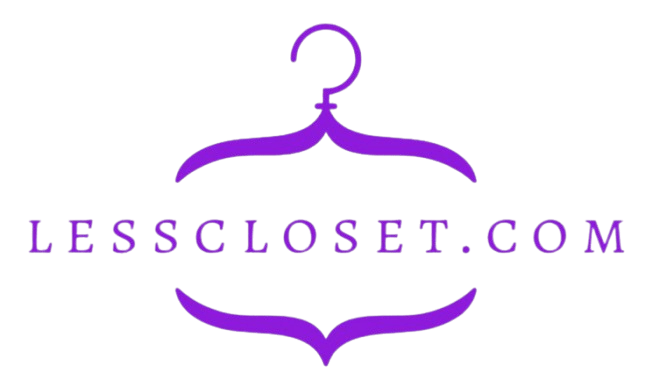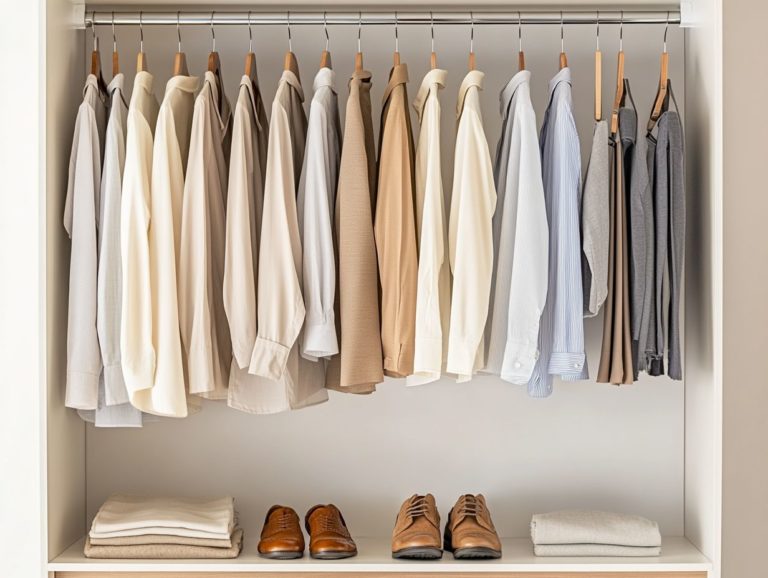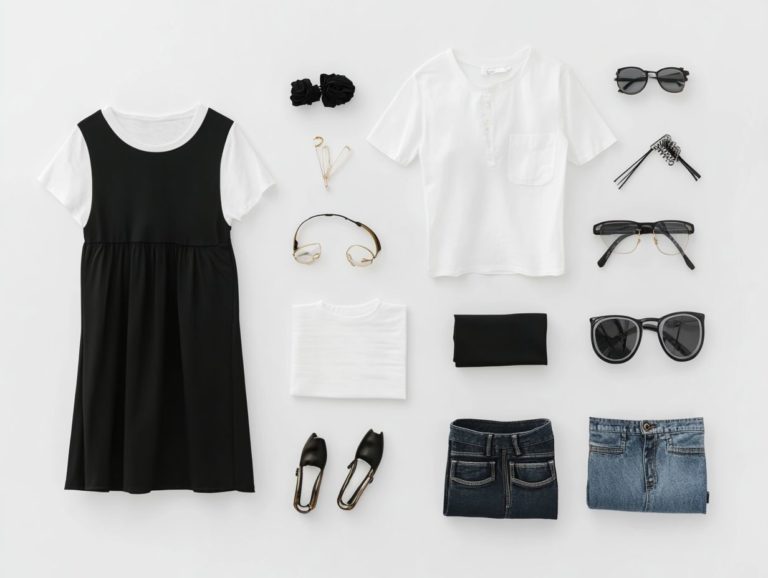Can Minimalism Save You Money?
In a world full of extra stuff, embracing minimalism provides a refreshing lens to reevaluate your lifestyle and financial management. This approach highlights how eliminating the unnecessary can lead to significant financial savings, enhanced mental clarity, and a deeper sense of contentment.
Get ready to unlock practical budgeting tips that can change your life and explore the intricate relationship between minimalism and financial freedom.
Together, we will delve into both the benefits and challenges of adopting a minimalist lifestyle. Don t wait! Discover how having less can mean having more today!
Contents
- Key Takeaways:
- What is Minimalism?
- Minimalism and Money
- Practical Tips for Incorporating Minimalism into Your Finances
- The Impact of Minimalism on Mental Health
- Challenges and Considerations of Adopting a Minimalist Lifestyle
- Frequently Asked Questions
- Can Minimalism Save You Money?
- How can minimalism help me save money?
- Do I have to get rid of all my belongings to practice minimalism?
- Will I have to sacrifice my lifestyle to save money through minimalism?
- Can minimalism help me save money in the long run?
- Are there any other benefits to practicing minimalism besides saving money?
Key Takeaways:

- Minimalism is a lifestyle that focuses on intentional and mindful consumption to simplify life and save money.
- By reducing expenses, investing in quality over quantity, and prioritizing financial freedom, minimalism can lead to significant long-term savings.
- Embracing minimalism can improve your mental health by reducing stress and increasing contentment.
What is Minimalism?
Minimalism invites you to embrace simplicity and intentionality, urging you to prioritize your needs over mere wants. It s about decluttering both your physical and mental spaces, honing in on what truly matters while pursuing financial freedom through mindful consumption.
Inspired by advocates like Marie Kondo, this approach encourages a minimalist mindset focused on reducing consumption and fostering a deeper appreciation for quality items and experiences rather than accumulating material possessions. To better understand this approach, learn about what a minimalist lifestyle is. By adopting minimalism, you can cultivate a living space that not only reflects your values but also supports a more sustainable way of life.
Minimalism and Money
Embracing a minimalist approach can profoundly elevate your financial aspirations by encouraging frugal living and cost-cutting strategies that pave the way to financial freedom.
When you prioritize purchasing only what you genuinely need, you can channel your resources into meaningful experiences and thoughtful investments. This intentional redirection enhances your financial security and creates calmness in your life.
How Minimalism Can Help You Save
Minimalism invites you to distinguish between your needs and wants, paving the way for significant savings and a more fulfilling lifestyle.
When you adopt a minimalist mindset, you’ll dive deeper into what really matters to you, discovering that simplifying your life often leads to financial freedom. This intentional approach promotes living where every purchase is thoughtfully considered, helping you sidestep the pitfalls of impulse buying. If you’re wondering, is minimalism only about clothes? the answer might surprise you.
As you train yourself to concentrate on what truly adds value to your life, frugality becomes second nature. This enables you to redirect your resources toward more meaningful experiences and investments. Embracing this philosophy can help you understand how to make minimalism a lifestyle choice, not only trimming your expenses but also enhancing your overall well-being by cultivating gratitude for what genuinely matters.
The Link Between Minimalism and Financial Freedom
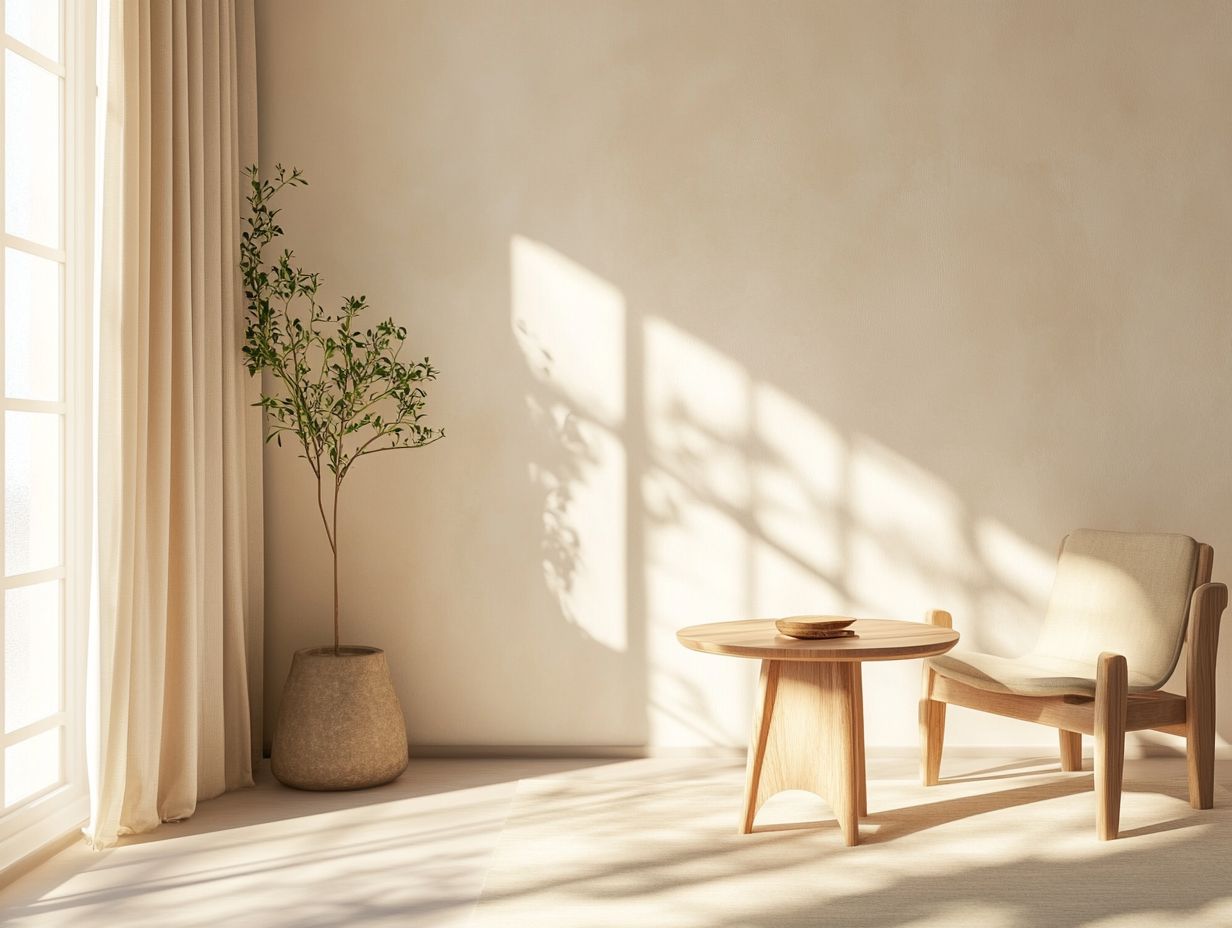
The connection between minimalism and financial freedom lies in your ability to reduce consumption, which enables you to allocate more resources toward future planning and investments, such as stocks.
By embracing a minimalist lifestyle, you can streamline your expenses and focus on what truly adds value to your life. This shift not only curbs unnecessary spending but also fosters a disciplined approach to budgeting and saving.
As you learn to differentiate between wants and needs, you can redirect your savings into high-yield investment accounts or retirement funds, ultimately building a solid financial foundation.
Over time, this steadfast commitment to frugality and targeted asset allocation which means deciding how to spread your money across different types of investments can develop into a sustainable wealth-building strategy that sets the stage for long-term financial independence.
Start your minimalist journey today and transform your life!
Practical Tips for Incorporating Minimalism into Your Finances
Incorporating minimalism into your finances requires a thoughtful approach that includes practical steps. Consider implementing a well-structured budget, prioritizing home-cooked meals, and opting for eco-friendly choices that resonate with your financial goals.
This mindful strategy not only enhances your financial health but also aligns with a lifestyle that values simplicity and sustainability.
Reducing Expenses and Simplifying Your Budget
Reducing expenses is at the heart of minimalism. It allows you to simplify your budget and focus on what truly matters.
By concentrating on essential spending, you can sidestep the distractions of societal pressures that often dictate how you use your money. A practical approach involves distinguishing between your needs like housing, food, and healthcare and your wants, such as dining out or indulging in luxury items. This heightened awareness fosters more mindful spending decisions, and learning how to adapt minimalism to your lifestyle can further enhance your financial well-being.
Crafting a detailed budget that reflects these priorities streamlines your finances and gives you the power to allocate resources more effectively. Utilizing tools like expense tracking apps can offer clarity, helping you understand your spending habits and paving the way for a more sustainable financial lifestyle.
Investing in Quality over Quantity
Investing in high-quality items instead of giving in to the temptations of fast fashion is a fundamental principle of minimalism that encourages intentional living.
By prioritizing durability and craftsmanship, you not only elevate your personal style but also contribute to creating a more sustainable future. When you choose quality over quantity, you’ll discover that a few well-made pieces give greater satisfaction and functionality, helping you cut down on the clutter that often comes with consumer habits.
This thoughtful selection process allows you to curate a wardrobe that reflects your values, emphasizes versatility, and ensures that each item is cherished rather than easily discarded.
Embracing quality items fosters a deeper connection to your possessions, beautifully aligning with the minimalist ethos of living purposefully and fully in the moment.
The Impact of Minimalism on Mental Health
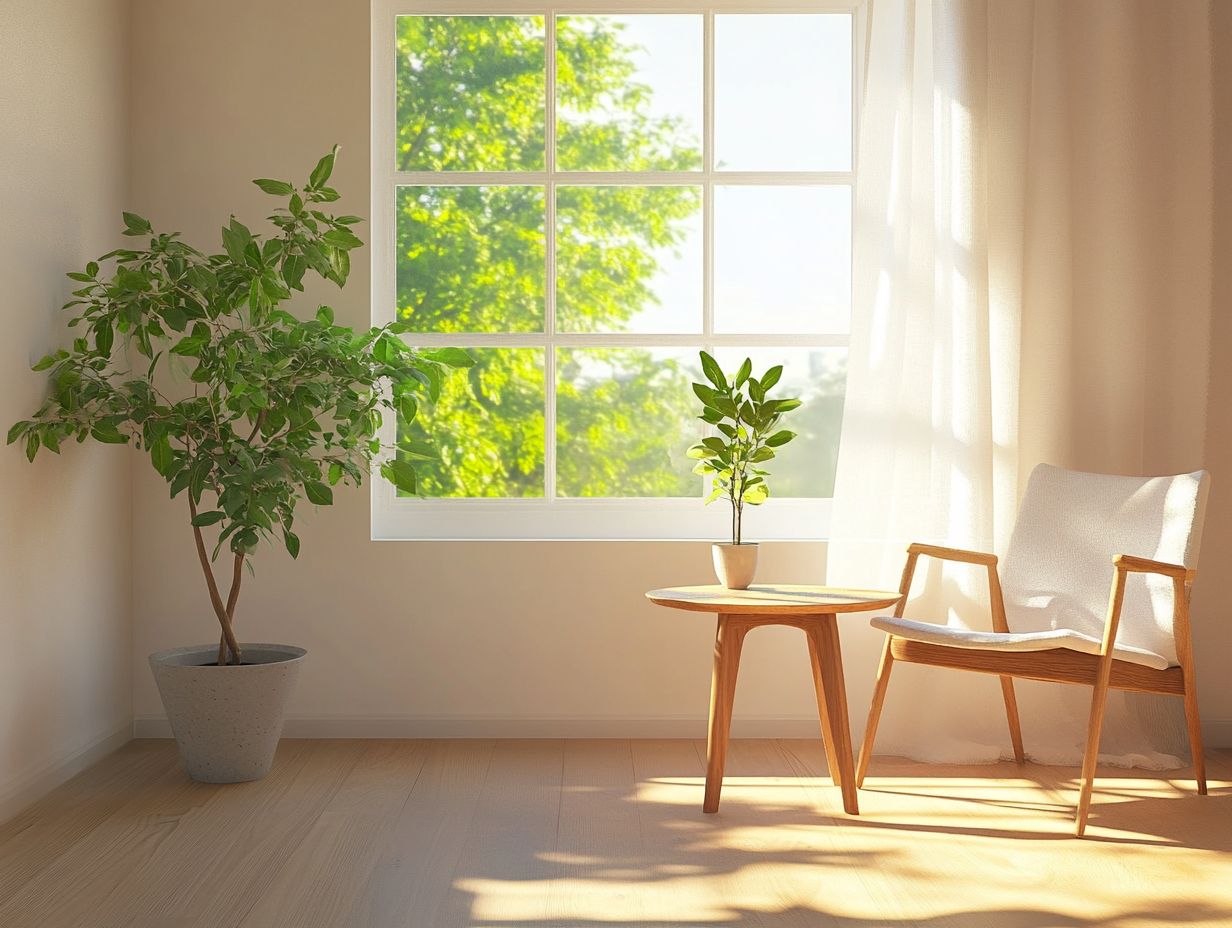
The impact of minimalism on your mental health can be truly transformative. This approach can reduce stress and increase happiness, as it encourages you to cultivate a simpler, more intentional lifestyle.
Reducing Stress and Increasing Contentment
One of the most significant benefits of minimalism is its remarkable ability to reduce stress. It allows you to focus on contentment and joy in your life.
By embracing a minimalist lifestyle, you can streamline your belongings, decluttering not only your physical spaces but also alleviating mental clutter. Techniques like the ‘one-in-one-out’ rule encourage you to thoughtfully consider new purchases, ensuring that each item you acquire holds meaningful value. If you’re wondering, is minimalism right for everyone? can help you explore whether this approach suits your life.
Engaging in intentional living prompts you to prioritize experiences over possessions, fostering deeper connections and a sense of satisfaction. Mindful practices, such as regular digital detoxes, promote tranquility, enabling you to disconnect from the overwhelming flow of information and embrace simplicity.
As you cultivate gratitude for what you have, a profound sense of peace and fulfillment often emerges, paving the way for a more balanced life.
Challenges and Considerations of Adopting a Minimalist Lifestyle
Embracing a minimalist lifestyle brings an array of benefits. Yet, it also introduces challenges that demand thoughtful consideration, especially regarding your community and the environment.
Start your minimalism journey today!
Addressing Potential Obstacles
Addressing potential obstacles in adopting a minimalist lifestyle is crucial for maintaining your commitment to living simply and saving money and thoughtful decisions.
You may often find yourself facing pressure from society and internal doubts fueled by a fear of letting go. View these challenges as common hurdles rather than signs of personal failure.
Engaging with a supportive community can significantly lighten your journey, offering encouragement and shared experiences that validate your intentions.
Connect with others who embrace simplicity! You’ll uncover practical advice and emotional support that are invaluable during moments of uncertainty. This synergy not only strengthens your resolve but also fosters a sense of belonging, transforming your path to intentional living into a more rewarding and joyful experience.
Frequently Asked Questions

Can Minimalism Save You Money?
Yes, minimalism can save you money by encouraging you to buy only what you truly need.
How can minimalism help me save money?
By simplifying your life and adopting a minimalist approach, you can save money on buying and maintaining items you don’t truly need while enjoying experiences that matter.
Do I have to get rid of all my belongings to practice minimalism?
No, minimalism looks different for everyone. You can start small by decluttering your living space and only keeping what adds value to your life, focusing on high-quality items over fast fashion.
Will I have to sacrifice my lifestyle to save money through minimalism?
Not necessarily. Minimalism is about prioritizing what is important to you, embracing simple living, so you can still enjoy the things that bring you joy while cutting back on unnecessary expenses.
Can minimalism help me save money in the long run?
Yes, minimalism encourages mindful spending and helps you differentiate between needs and wants, avoiding impulse purchases, which can lead to long-term savings and financial stability.
Are there any other benefits to practicing minimalism besides saving money?
Yes, minimalism can also help reduce stress, increase productivity, and improve overall well-being by simplifying your life, reducing consumption, and promoting making choices that matter to you.
